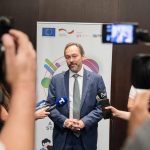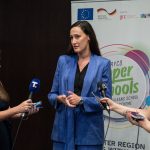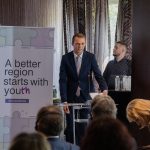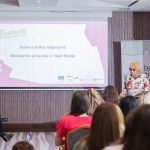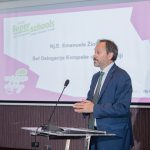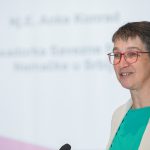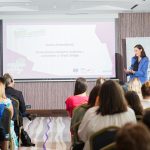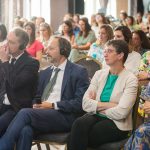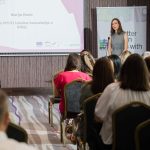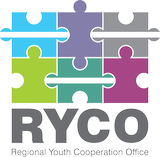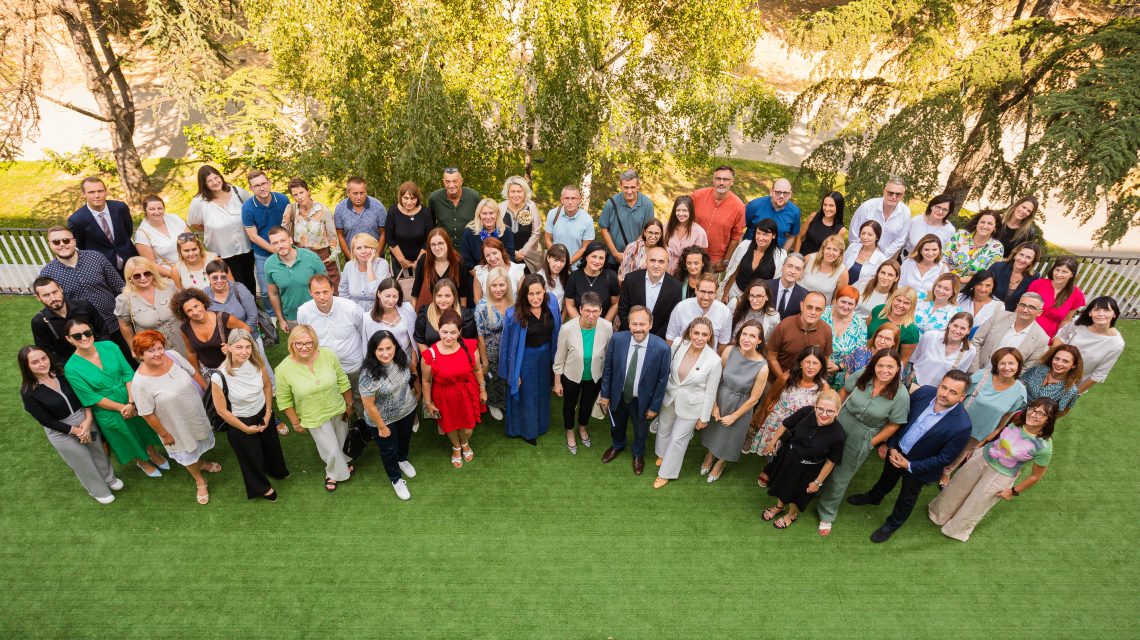BELGRADE – This year, 30 schools from Serbia have been awarded the title “Superschools,” and their projects, which will contribute further to peacebuilding, reconciliation, intercultural learning, and dialogue between schools, students, and their communities through the School Exchange Program in the Balkans, were presented today at a public event titled “Meet the Superschools.” The event was organized by the Regional Youth Cooperation Office (RYCO) in collaboration with the Deutsche Gesellschaft für Internationale Zusammenarbeit (GIZ).
The event was attended by representatives of the selected schools, the Minister of Education Slavica Đukić-Dejanović, the Head of the EU Delegation to Serbia H.E. Emanuele Giaufret, the Ambassador of the Federal Republic of Germany to Serbia H.E. Anke Konrad, the Assistant Minister of Tourism and Youth Ivana Antonijević, and the Head of the RYCO Local Branch Office in Serbia, Marija Bulat.
In her opening remarks, Minister Đukić-Dejanović emphasized the importance of regional programs like “Superschools,” which focus on high schools and praised the efforts of schools in creating a safe environment for young people and their contributions to questioning social constructs that burden the region.
“The schools have been selected for their innovation and commitment to education, and their work and efforts will now be further supported, thereby strengthening not only the individual schools that are part of the project but the entire education system in Serbia,” emphasized Slavica Đukić-Dejanović, Minister of Education.
The “Superschools” program, dedicated to promoting youth mobility, provides a unique opportunity for connecting peers from the region and fosters intercultural dialogue and cooperation among high school students in the Western Balkans.
EU and Germany are supporting peacebuilding, reconciliation, and intercultural learning and dialogue through school exchanges. The European Commission, in collaboration with the German Federal Ministry for Economic Cooperation and Development, is proud to continue supporting this initiative, which not only promotes reconciliation and cooperation but also empowers young people to critically explore and reassess the region’s heritage.
“Today, as we celebrate the success of the third call of the ‘Superschools’ program, I want to highlight the enormous importance of regional initiatives like this one, which are specifically aimed at high schools. Such programs are crucial not only for strengthening the process of reconciliation and intercultural dialogue among young people in the Western Balkans but also for developing critical thinking and acquiring new skills and knowledge. The European Commission, together with the German Federal Ministry for Economic Cooperation and Development, is proud to continue supporting this initiative, which not only promotes reconciliation and cooperation but also encourages young people across the Western Balkans to shape the future,” said Emanuele Giaufret, Head of the Delegation of the European Union to the Republic of Serbia.
The program is part of a broader package of support from the European Commission to improve the status of young people in the EU and the Western Balkans.
The Ambassador of the Federal Republic of Germany, Anke Konrad, highlighted the importance of the program for mutual understanding among young people:
“Exchange between young people is crucial for a better understanding and for overcoming prejudices. The Superschools program supports reconciliation and regional cooperation in the Western Balkans in an excellent way. We are happy to see the Regional Youth Cooperation Office (RYCO) contributing to this exchange in the framework of the Berlin Process. All the best to the 3rd edition of Superschools.”
The Ministry provides full support to initiatives that contribute to empowering young people, and thus, Assistant Minister of Tourism and Youth of the Republic of Serbia, Ivana Antonijević, expressed satisfaction with the continuation of the project:
“We are pleased that the ‘Superschools’ project continues and that the opportunity for youth exchange in the Western Balkans has been created for the next three years. Through the exchanges organized, young people have the opportunity to learn from each other through experience, build friendships, and connections that last even after the program ends. Teachers have the opportunity to exchange experiences, and schools have the opportunity to establish institutional cooperation, all of which contribute to the process of reconciliation. We believe that investing in connecting young people is the most important factor for sustainable regional cooperation.”
Marija Bulat, Head of the Local Branch Office of the Regional Youth Cooperation Office in Serbia, reflected on the program’s results to date:
“So far, 1,850 young people have participated in exchanges, as well as 300 teachers who had the opportunity to strengthen their knowledge and skills through special programs created for them, and 154 schools have been part of the program to date. The success of the program is evidenced by the fact that 90% of the young people who participated in the activities stated that after the program, they better understand the perspectives of others in the region and do not judge them, and they feel they have found lifelong friends through the program. Staying with families further contributes to deeper connections, understanding, and bridging differences, which is an additional element of this year’s program cycle,” concluded Bulat.
Apart from presenting project ideas, the event also served as an opportunity for representatives of the selected schools to get to know each other better and engage in discussions with important local and international partners of the Superschools project, as well as to learn more about the next steps in the exchange implementation process.
The upcoming exchange activities will be conducted from November 15 this year to April 15 next year, and school staff will coordinate and develop the activities with the help of RYCO mentors. The list of 90 high schools from the region, including 30 from Serbia, can be viewed on the website of the Regional Youth Cooperation Office.
During the project implementation phase, each school will organize a visit to a partner school lasting up to 7 days, and students will travel accompanied by one or two teachers. The school exchange program will allow students and teachers to travel, present themselves, their schools, and customs, and learn something new about local communities in different parts of our region.
During the third open call for ‘Superschools,’ more than 90 exchange proposals were submitted, 113 partnerships were created (including 21 long-term partnerships between schools that participated in the first exchange cycle), and more than 579 high schools from the Western Balkans used the platform www.superschools.net to connect with other schools, making it challenging for the commission to select the 45 best projects.
About the Superschools program
Superschools is a RYCO program for school exchanges in the Western Balkans. Its objectives are to support peacebuilding, reconciliation, and intercultural learning and dialogue among schools, students, and their communities. The program is part of the multi-donor project “Western Balkans School Exchange Scheme,” co-financed by the European Union and the German Federal Ministry for Economic Cooperation and Development (BMZ), and implemented by the Deutsche Gesellschaft für Internationale Zusammenarbeit (GIZ) together with the Regional Youth Cooperation Office (RYCO).
